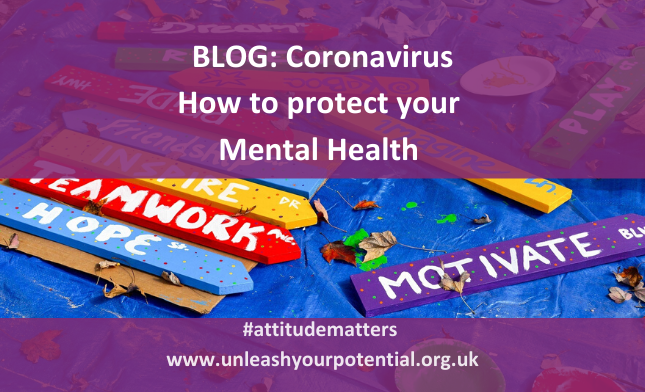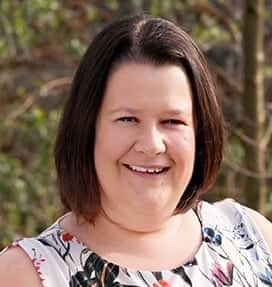Coronavirus has undoubtedly plunged the world into uncertainty. The relentless posts on social media, people speculating, adding fuel to the ‘Fear Fire’ has got out of control. People are feeling heavy and are worrying because they see others worry. The news channels are full of talk of the Coronavirus – some people are watching news channels hour after hour (the challenge is even when there is nothing new to say the news outlets have to find something to fill the airtime with, so you get ‘expert’ after ‘expert’ sharing relentless repetition of the same negative messages). All of this is taking its toll on people’s mental health, particularly those already living with worry, anxiety, stress and more. So how do we protect our mental health?

Fear will get more people than coronavirus … listen to this …
Be careful that you don’t take opinion as fact. Social media is what has fuelling the fear (supported by the news outlets) with lots of misinformation swirling around and taking on a lifeform of it’s own. A lot of anxiety is rooted in worrying about the unknown and waiting for something to happen. When feeling anxious, thoughts can spiral out of control and some people start taking bits of information, start generalising them and start thinking of catastrophic outcomes – this is not helpful. People look to others for guidance – the truth is we need to deal with the FACTS as we know them (not someone else interpretation of them). Lots of big sporting events got cancelled at the weekend, which led to more people bored at home and so spending more time on social media. We know for a FACT that social media is not a reliable source of accurate facts and updates. Please remember it’s only bad news that sells and get’s people watching TV channels – so the papers are full of it as are the news channels (they are capitalising on your fear – it’s time to take back control of your mind!). Funny how no-one is sharing the great news that 80.9% of infections (the VAST MAJORITY) are mild flu like symptoms (source: China Centre for Disease Control & Prevention).
Now I’m not saying you shouldn’t stay informed. What I am saying is follow the government’s advice (not the advice of social media!). Here is the link to the government official advice: UK Government advice.
What does the World Health Organisation say about protecting your mental health during the coronavirus outbreak?
The World Health Organisation has published a guide on mental health and dealing with stress during the outbreak. You can access the guide here. Below are some of their tips:
- Avoid watching, reading or listening to news that could cause you to feel anxious or distressed.
- Seek information mainly to take practical steps to prepare your plans and protect yourself and your loved ones.
- Seek information updates at specific times maybe once or twice a day. The near constant stream of news is enough to make anyone feel worried. Get the facts.
- Find opportunities to amplify the positive voices, positive stories and positive images of local people who have recovered.
What are my top tips to protecting your mental health?
- Limit the amount of time spent on Social Media & consider what you’re consuming when on it – social media is a double edged sword. Right now I am limiting my time on Social Media and when I’m on it I’m focusing on connecting with loved ones and only consuming posts/videos from people who I know are positive and will lift my sprits and energy. Remember you always have the option to unfollow people (they won’t know you’ve done it) and this is a quick way to clean up your news feeds.
- “I am ….. “- we know in NLP that what we focus on we get. We also know that the mind and body are connected (your mind can positively or negatively impact your physical health). So I am keeping myself focused on positive I am statements that I say to myself. “I am fit, I am healthy, I am well”. “I am positive, I am a force for good, I am grateful”. Now, please don’t misunderstand me, if you have any of the symptoms the UK government have identified (as I write this it’s a high fever or persistent new cough) you should follow their advice of self isolation. However to keep my mental health in a good place I am focus on what I want more of in my life.
- Spend time with those that lift you up (stay away from bad energy) – we all know the people I’m talking about. Spend time with people who spiral up your positive energy and positive emotions. People who are calmly looking for practical proportionate solutions. Right now I’m focused on my passion for what I do, my enthusiasm to help my community, considering how I can be of positive service (hence this blog!) and looking for opportunities in my business to pivot or help in a new way. This is very different to some of the ‘bad’ energy of others who, if I spend time with (virtually or in person) would drain me. I am focused on reading, consuming, and doing things that make me feel light – smiling, laughter is great for raising the right energy in you and the happy hormones too! – do you have a favourite comedy you could watch tonight?
- Dealing with the here and now – now we could all sit and think about the ‘what ifs’ and wind ourselves up about things that may never happen. You can’t really respond until there is something to respond to and even then, calm thinking with clarity of thought is best. This is why following the governments advice is key. What is currently happening to some people is that they are winding themselves up so much, they are getting anxious and stressed (with all the associated physical and emotional responses that go with that in your body – such as it being flooded with the stress hormone Cortisol or your heart rate rising). When the body is operating in that state over a period of time your immune system gets run down, leaving you more susceptible to any germs or viruses around you. So getting stressed makes the chances of getting it higher. If you’re someone who suffers with catastrophic thinking you can stop the invasion of this thinking by asking yourself: what’s happening right now? What action do I need to do right now? (and avoid getting anxious about what’s not happened yet- as one famous quote from Montaigne says: “my life is full of terrible misfortunes, most of which never happened”). Also, ask yourself what can you do to reduce stress, reduce anxiety and stay calm?
- ‘What you focus on you get’ – If you are focusing on everything going wrong and giving attention to what you don’t want to happen you increase the chances of it happening. Now I’m not saying you shouldn’t take sensible precautions like hand washing, staying 2 metres from unwell people etc (as per government advice) but too many people are already acting like they have this virus. Dr. Tad James (head of the ABNLP that accredits all my NLP courses) say “Anxiety is a warning from the unconscious mind to focus on what you want”. Essentially if you are getting anxious you are focusing on the very thing you don’t want to happen. The more attention you give it the bigger the thoughts and associated feelings magnify. Now if you focus on things turning out well and magnify these thoughts by repeating them over and over again (see I am statements from earlier) that’s going to be more useful, isn’t it?
- Find the upside/the opportunity – they say there is always a silver lining to every cloud. In this case you just need to find it? The reality is that we may all be asked to stay at home and when this happens lots of people will still be fit and well – consider how what could you use this time to achieve? could you use it to reconnect with loved ones? what would it be useful to do? what could you learn? What personal development could you complete? (did you know we have a series of online courses? – you can check them out here).
I hope this blog has been useful and if you’d like me to write some more blogs to help you get through this, let me know!
Feel free to get in touch with us via phone on: 02920 023311 or drop us an email at: [email protected]


